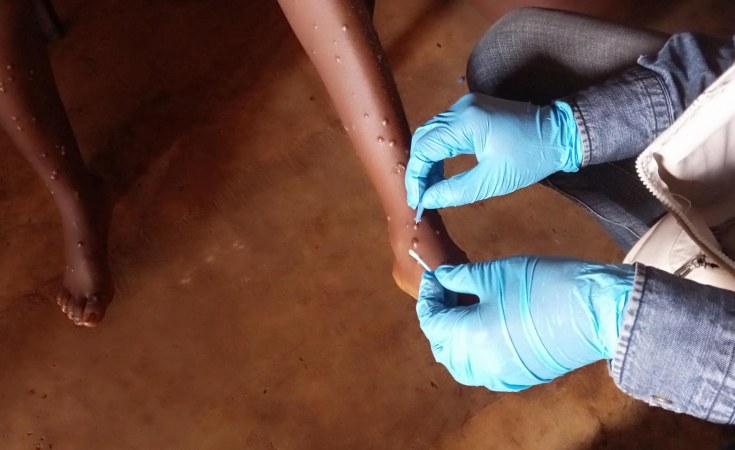The first cases of Mpox have appeared in Zimbabwe, both almost certainly contacted outside the country, probably when the patients visited South Africa and Tanzania.
This was inevitable and cases have now appeared in a lot of countries because people do travel and so the virus has moved out of the African equatorial forests, where certain rodents have been identified as the reservoir.
Cases outside the home forests are still not dramatically high, largely because health ministries around the world went on alert as the World Health Organisation issued its warnings.
So while there is need for people to be alert, and to follow medical advice, there is no cause for panic.
Helpfully, the symptoms are fairly obvious and are unlikely to be mistaken for anything else.
So while the usual complex virus tests are needed to confirm, medical staff can be almost dead certain of their diagnosis when they see them, and Zimbabwe has been fairly typical here in this.
All medical staff, from community and clinic nurses upwards were told what to look for and who to contact if they saw something even vaguely suspicious, so that further action could be taken to treat the patient and to make sure the people the patient was living with or working with also knew what to look for and would seek medical attention if the symptoms turned up.
Most people now know how viral diseases can spread and what sort of action is needed to break chains of infection.
Covid-19 taught us a lot, and while Mpox is not nearly as dangerous as Covid-19 it is still more dangerous than say a common cold, so we all need to be alert.
The Ministry of Health and Child Care is doing its job, not only in setting up and using the reporting structure for cases, but also to make sure Zimbabweans are in the picture and are aware that Mpox cases have occurred.
This means we can rely on fact, rather than rumour and social media, and then trust the advice we have been given and may be given.
We all need to cooperate with the Ministry and our personal health advisors who in turn will be in contact with the Ministry.
This cooperation goes beyond just taking the medical advice and includes the requirement that we do remain largely isolated, even if we are not feeling that ill and are recovering at home, so we do not pass the virus on to others.
We also need to make sure that whoever is doing the contact checking has as complete information as possible about who we have been with since the most likely moment of infection and the most likely moment of the eruption of symptoms, and how close that contact was.
We are largely talking about close physical contact, which cuts down the numbers significantly, but we still need to pass on the information and let the experts decide if the risk of infection is high enough to check with any particular contact.
The Ministry of Health and Child Care has been identifying, alerting and checking the contacts of the first two cases, and will no doubt continue that process.
If anyone suddenly is told that they are a possible contact, they should take the warning seriously and cooperate fully with health staff, and rush to where they are told to go if symptoms emerge.
Mpox is a viral illness, so there is no cure. One or two antiviral drugs can relieve symptoms, but generally a patient just needs nursing and has to let nature take its course.
There is a vaccine that helps, although manufacturers would need to restart for this vaccine. Mpox belongs to the same genus of DNA viruses as smallpox and the variola smallpox vaccines apparently give some protection.
This is one reason why the disease was at one time almost wiped out among humans and the major global vaccination drive that eventually eliminated smallpox gave enough protection against Mpox to at least cut infection chains and in many case eliminate them.
Because the virus lives in some rat and squirrel species in the Equatorial African forests of Central and West Africa, it was not eliminated with smallpox, and has been able to re-emerge into human populations.
The old name of "monkeypox" arose because the disease was first seen among laboratory monkeys, who had been infected from the same reservoir of rodents that infected humans.
Several species of animal can be infected, along with humans, but are not the source of the infection.
Many older people may still have some residual protection against Mpox from their smallpox vaccinations of 44 and more years ago, before WHO declared that disease dead and vaccinations no longer needed.
But the last vaccine scratch was a long time ago and younger generations have never had that particular vaccine, although they have been fortunate with a lot of others that their parents never benefited from.
But still, older people might well have better protection and probably more mild symptoms if they do become infected.
However, if Mpox ever becomes a serious infection in terms of numbers, a vaccine is available and presumably can be upgraded to be more specific against the Mpox virus types.
That is a relief. If we have to switch from alert and care to vaccination, the world could do that, with a vaccine that wiped out one of the worst diseases in history.
Meanwhile, we need, as always, to be sensible and take the advice of the Ministry of Health and Childcare, and support the efforts of the Ministry when we are called upon to do so.


